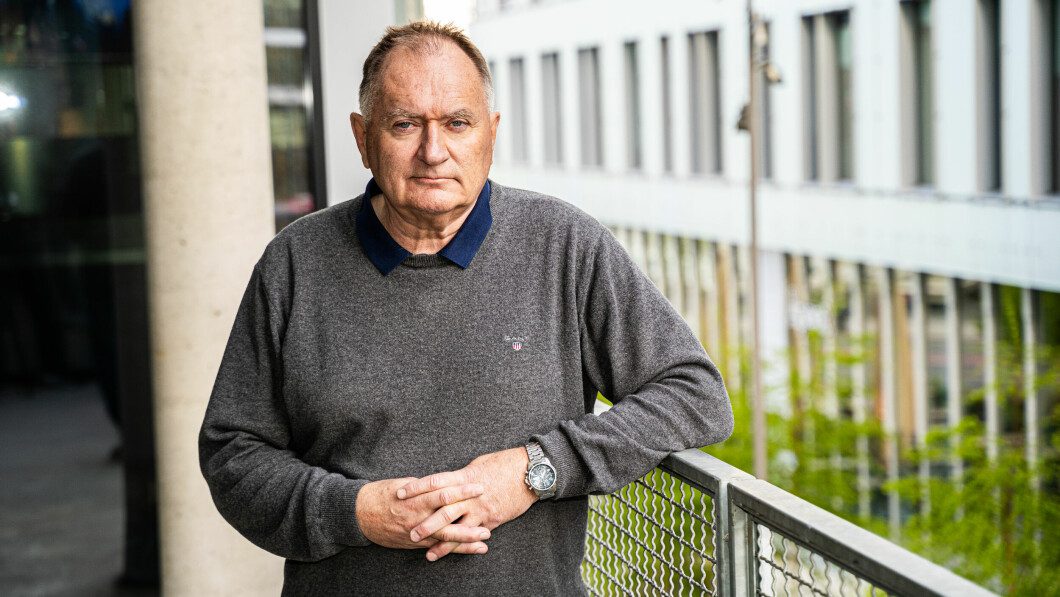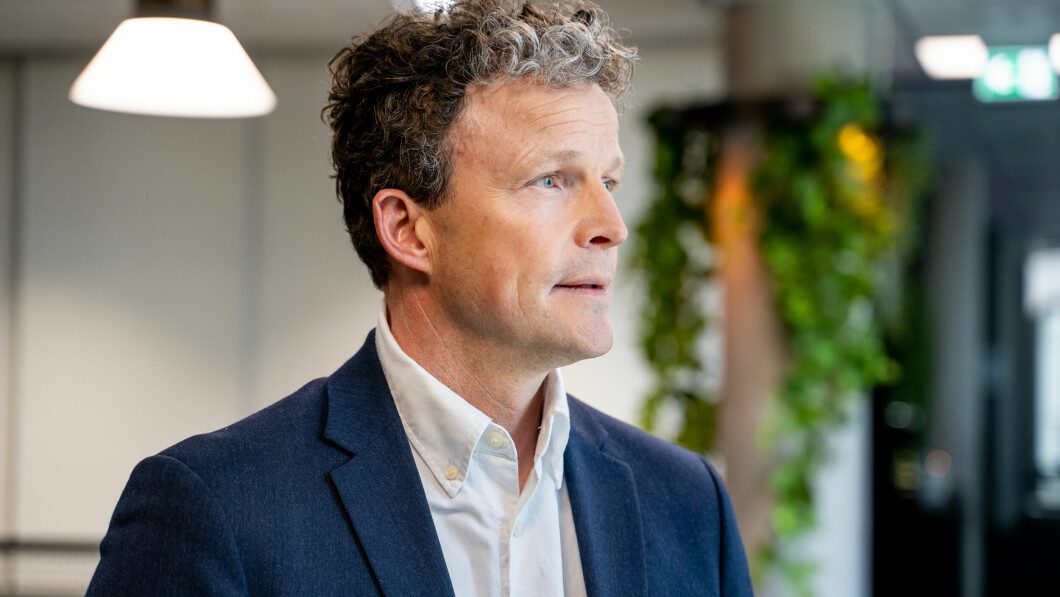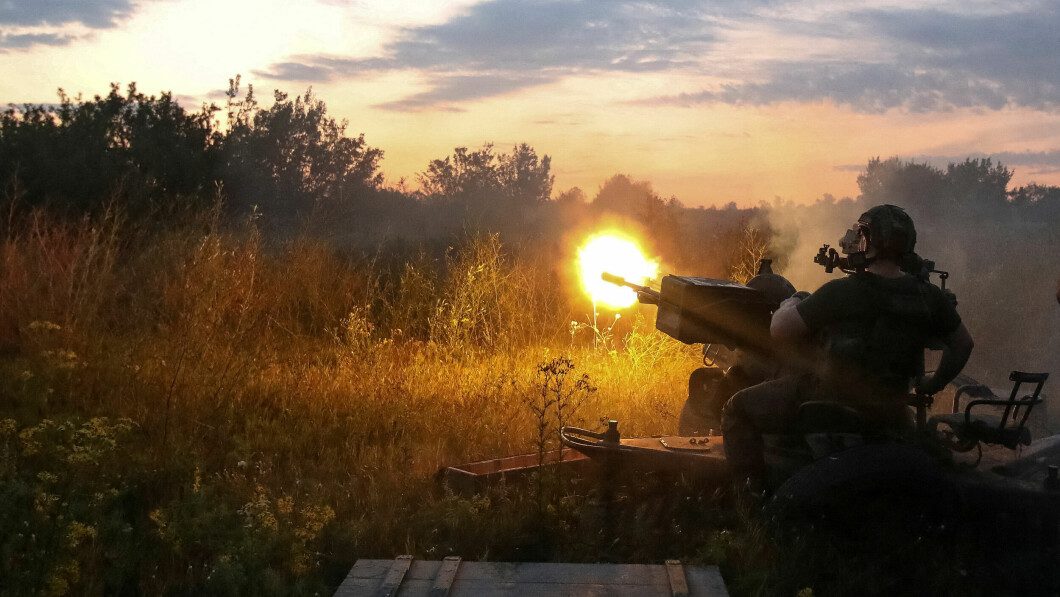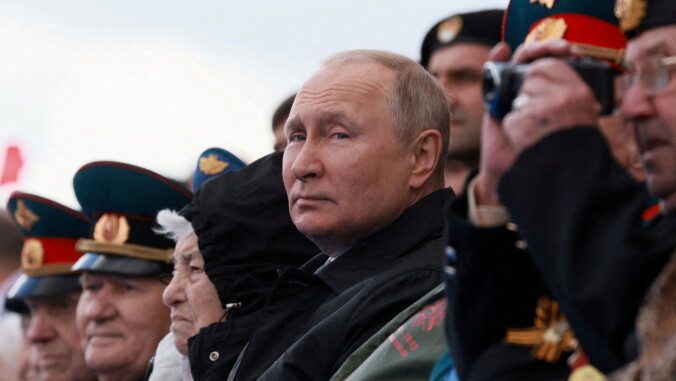Nuclear fear concerns the inhabitants of Zaporizhzhya. In Innerhodar, not far away, Russian forces are in control of a huge nuclear power plant, and in recent days Russia and Ukraine have accused each other of plans to attack the power plant.
In a parking lot, TV 2 meets Nadezhda, who recently ran away with her disabled five-year-old daughter to Zaporizhia from the village of Mikhailivka. She says that life in the areas occupied by Russia is getting more and more difficult with each passing day.
– If someone leaves their house, the Russians cut the lock, break in and steal everything. This is the kind of freedom that Russia brings, says Nadezhda.
Refugee: Nadezhda says that the Russians rob and harass the population in the occupied territories. Now she hopes for a better life in Zaporizhia, but is afraid of the threat from the nuclear power plant. Photo: Aage Aune/TV 2
Although she is grateful for her escape from the Russians, the threat from the nuclear power plant hangs over her and the many newly arrived refugees in Zaporizhia.
– I’m very, very scared. There are 1.2 tons of uranium there. That’s enough for the whole of Europe, everyone! Nadezhda says the Russians say the nuclear power plant belongs to them, or no one at all.
Sixth sense builder
In the same position, 82-year-old Miroslav is sitting in the back seat of a wrecked car. His family turned to Zaporizjzja, but Miroslav did not have a chance to meet them until the car was fixed. Therefore, for the past five days he lived in the dilapidated car, not seeming particularly worried that the nuclear power plant would rise into the air – he himself helped build it.
– I was a factory driver. 1800 tons with all kinds of cargo: coal, dirt, concrete walls, heavy pillars… anything is possible. Of course it’s good craftsmanship. I built it myself!
Improvement: Although Miroslav has been living in the back seat of a broken car for the past five days, he prioritizes personal hygiene. TV 2 meets him in the middle of his morning episode. Photo: Aage Aune/TV 2
The retired construction worker goes so far as to ensure that the nuclear power plant is safe, even in the hands of Russia. Miroslav has a sixth sense.
– It won’t explode, I’m 100% sure. I will feel it myself, I have this ability, I assure the 82-year-old.
The war of words continues
Back home in Norway, Miroslav supports many defense experts who rely on intelligence rather than sixth sense. General and former Defense Minister Sverre Diesen believes that the current situation in Zaporizhzhya is challenging, but doubts that one would see an attack on the power plant.
“There is no point in having a nuclear power plant in a war zone, but neither side has an interest in starting to leak radioactive material like steam or the like,” explains Dessen.
Clear speech: The general and former Secretary of Defense, Ambassador Diesen, is unconcerned about the nuclear power plant. Photo: Odd Arne Hartvigsen/TV 2
He believes that the heated rhetoric surrounding the nuclear power plant fits with the ongoing war of words between Russia and Ukraine.
It is tempting, of course, to accuse the other side of being irresponsible. Now that Russia is in de facto control of the power plant, it is also natural that they accuse Ukraine of preparing a counterattack. I still think we should be vigilant about what they say in this case.
political game
Tom Rosth, director of the Intelligence Department at the Staff School, also believes that the power plant is joining the war of words. He says there is a lot of significant political activity around the events, including talks between Turkish President Erdogan and Ukrainian President Zelensky.
– This is a game with the United Nations and Ukraine where the Russians refuse to leave the region and demilitarize them because they claim it will open up terrorism and insecurity, says Rosseth.
Russia has previously accused Ukraine of bombing and sabotaging the power plant in Zaporizhia, then blamed the Russians. Rosth believes that this, too, is part of Russia’s political discourse.
Tom Røseth is the principal lecturer in observation at the Norwegian Defense Academy, and believes Russia is using the nuclear power plant to divert focus from other issues. Photo: Kristen Groening/TV2
– In the Russian media, they are sounding the alarm about activity in the region. But what is actually happening is that the Russians are using the situation in the region as a springboard to take the focus away from other issues and enhance Russia’s role.
He points to two reasons behind Russia’s interest in continuing to control the power plant.
First, Russia could use it as leverage to get Ukraine to enter into concessions or, through international organizations, to advance a degree of legitimacy for its occupation of the region, says Rossith.
– Secondly, it is a means of political and social pressure, which means that other countries and international organizations have to give a role to Moscow. At the same time, Russia has made hard-to-accept demands, which indicate that it does not want international monitors in place to retain full space for action.
The situation is blocked
Next week will be half a year since Russia invaded Ukraine. Disin says that extensive Western arms aid, especially long-range artillery, has contributed to Ukraine’s now halting the Russian offensive in the Donbass and isolating the Russian bridge west of Dnipro at Kherson. Almost six months after the invasion, the parties were at a relative dead end, with no one able to resume the offensive and make a decision.
The stalemate also means that both sides need time to rebuild after heavy losses on both sides.
SOTT: Western arms aid is the main reason why Ukraine is now able to stifle the Russian initiative, Dessen’s ambassador believes. Photo: VYACHESLAV MADIYEVSKYY / REUTERS
In the long run, developments are in Ukraine’s favour, provided it continues to receive Western support. The West holds the key to the outcome of the war. But it does require a long-term strategy in which one builds Ukraine’s military capacity, not just to stop the Russians, but to drive them out. Then we talk about both materials and ammunition and training, which will take time, says Dessen.
He assures that such a process will take time. First, Ukraine must stabilize the front across the country, before one can consider building a military apparatus to go on the offensive strategically.
– In terms of time, we’re done in 2023, Dessen points out.
Putin can take off his clothes
The longer the situation reached a dead end, the better the news for Ukraine. And all this is bad for the Russians and Putin, the former defense minister believes.
– Time is running against the Russians. Neither morale nor discipline was particularly good, while the Russians constantly allowed the soldiers of the subjects of the Asian Federation and the Far East to bear the brunt of the war. They survived, as far as possible, the ethnic Russian folk groups, which are the most important from a political point of view.
The challenge: Vladimir Putin faces many politically difficult decisions if he is to regain the initiative in Ukraine. Photo: Sputnik via Reuters
Dessen notes that the Russians have suffered heavy losses in the past six months. The only way to make up for these losses is the comprehensive mobilization of personnel reserves, which implies the call-up of conscripts also from the European part of Russia. In this case, this will be bad news for Vladimir Putin.
– In this case, you will have to go to a more thorough mobilization of all the potentials of Russia, which is difficult from a political point of view. Calling up reservists, that is, people who previously performed military service, would, of course, be extremely unpopular and at the same time a complete rejection of Putin’s rhetoric. He claims that this process is going entirely according to plan, but he cannot do this, and at the same time he says that you have to mobilize all the resources and forces that Russia has, concludes Dissen.
Traces the Ukrainian attack into winter
For Russians, there is a lot that has affected morale lately. Røseth points out that the war appears to be more stagnant because the Russians have become more and more tired over time.
The sentiment is still stronger on the Ukrainian side. It seems that the Russian side has become somewhat more enthusiastic after reducing the military operation to the Donbass region. But Russian morals cannot be compared with Ukrainian.
We want to see progress with a Ukrainian counterattack in Kherson and a slow Russian grind in the Donbass toward winter. Then the parties will likely be more exhausted and the front lines will be more steadfast this winter. Rosth concludes that this is a possible development.

“Organizer. Social media geek. General communicator. Bacon scholar. Proud pop culture trailblazer.”







